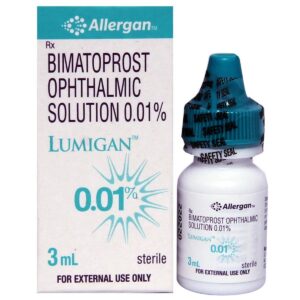BENZALKONIUM CL + BIMATOPROST
Benzalkonium Cl: Benzalkonium Cl (Benzalkonium Chloride) is a quaternary ammonium compound commonly used as a disinfectant and preservative in various pharmaceutical and personal care products.
Its primary use is as an antiseptic agent, often found in topical medications such as antiseptic creams, ointments, and hand sanitizers. It is effective against a wide range of bacteria, viruses, and fungi. It works by disrupting the cell membranes of microorganisms, leading to their destruction.
Benzalkonium Cl is generally applied topically to the skin or mucous membranes. The concentration and dosage may vary depending on the product and its specific indication. It is important to follow the instructions provided on the product label or as directed by a healthcare professional.
While Benzalkonium Cl is generally considered safe to use, it can cause some side effects. Common side effects may include skin irritation, redness, itching, or a burning sensation at the application site. Allergic reactions are rare but possible, and if experienced, medical attention should be sought immediately.
It is worth noting that long-term or excessive use of products containing Benzalkonium Cl may lead to skin dryness or irritant contact dermatitis. In some cases, prolonged use can also lead to the development of resistant strains of bacteria.
As with any medication, it is important to use Benzalkonium Cl as directed and consult a healthcare professional if any concerns or adverse reactions occur.
Bimatoprost: Bimatoprost is a medication commonly used to treat glaucoma and to enhance the growth and thickness of eyelashes. It falls under the category of prostaglandin analogue drugs and is available in the form of eye drops.
In the treatment of glaucoma, Bimatoprost is used to reduce intraocular pressure by enhancing the outflow of aqueous humor from the eye. This helps in preventing optic nerve damage, which is the primary cause of vision loss in glaucoma.
For enhancing eyelash growth, Bimatoprost works by prolonging the growth phase of the eyelashes and increasing the number of hairs that grow.
The typical dose for glaucoma treatment is one drop of Bimatoprost into the affected eye(s) once daily, usually in the evening. When using it for eyelash growth enhancement, it is applied to the base of the upper eyelashes using an applicator once daily.
Some common side effects of Bimatoprost include eye redness, itching, or irritation, increased growth and thickness of eyelashes, darkening of the skin around the eyes, dry eyes, and temporary blurred vision. It is important to note that Bimatoprost may cause changes in the color of the iris (the colored part of the eye), particularly in patients with hazel, green, or blue eyes. These changes are usually permanent and occur gradually over a long period of time. It is recommended to inform a healthcare professional if any side effects are experienced while using Bimatoprost.

